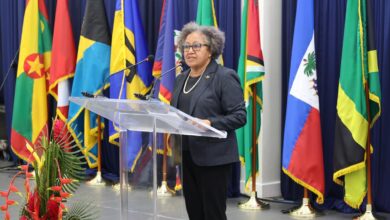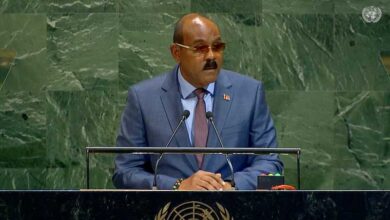We,the Heads of State and Government of the Caribbean Community, at our Thirtieth Meeting of the Conference in Liliendaal, Guyana from 2–5 July 2009, affirm our commitment to the principles and objectives of the Caribbean Community as embodied in the Revised Treaty of Chaguaramas establishing the Caribbean Community including the CARICOM Single Market and Economy –
1. Recalling the objective, principles and commitments of the 1992 United Nations Framework Convention on Climate Change (UNFCCC) and its Kyoto Protocol; 2. Gravely concerned that our efforts to promote sustainable development and to achieve the internationally agreed development goals including the Millennium Development Goals (MDGs) are under severe threat from the devastating effects of climate change and sea level rise which has led to increasingly frequent and intense extreme weather events, damage to bio diversity, coral bleaching, coastal erosion, changing precipitation patterns.
3. Emphasising that dangerous climate change is already occurring in all SIDS (Small Islands and Low-lying Coastal Developing States (SIDS) regions including the Caribbean and that many SIDS will cease to exist without urgent, ambitious and decisive action by the international community to reduce global greenhouse gas emissions significantly and to support SIDS in their efforts to adapt to the adverse impacts of climate change, including through the provision of increased levels of financial and technical resources.
4. Very concerned that the estimated total annual impact of potential climate change on all CARICOM countries is estimated at US$9.9 billion in the total Gross Domestic Product (GDP) in 2007 US$ prices or about 11.3% of the total annual GDP of all 20 CARICOM countries (Member States and Associate Member States) according to the World Bank estimates;
We Affirm:
1. Our belief that the global response to climate change should be undertaken on the basis of common but differentiated as well as historical responsibility and that it should not compromise the ability of SIDS to pursue Sustainable Development and the sharing of the cost of addressing climate change should be equitable and should not perpetuate poverty.
2. Our continued commitment to the work of the Intergovernmental Panel on Climate Change (IPCC) and call on all Parties to ensure that UNFCCC decisions are guided by that work;
3. Our Endorsement for the Caribbean Challenge in its efforts to protect the Region’s Marine Resources and in its work towards fulfilling the UNFCCC ecosystem-based management and adaptation recommendations and implementing the Millennium Development Goals related to reducing biodiversity loss;
4. Support for the co-ordinating role of the CARICOM Task Force for Climate Change and Development established by the Conference of Heads of State and Government and the implementing role of the Caribbean Community Climate Change Centre (CCCCC) and the roles of the CARICOM Secretariat, the Alliance of Small Island Developing States (AOSIS) chaired by the Government of Grenada and the CARICOM Representatives in the international climate change negotiations; and
5. The importance of a common Regional approach to address the threats and challenges of climate change and of the full and effective participation of the Region in the upcoming United Nations Climate Change Conference in Copenhagen, Denmark (COP15), the UN Secretary-General’s Climate Change Summit in September 2009 and their preparatory processes.
WE Declare:
1. That all Parties to the UNFCCC should work with an increased sense of urgency and purpose towards arriving at an ambitious and comprehensive agreement at the COP 15 in Copenhagen in 2009 which provides for: long-term stabilisation of atmospheric greenhouse gas concentrations at levels which will ensure that global average surface temperature increases will be limited to well below 1.5° C of pre-industrial levels; that global greenhouse gas emissions should peak by 2015; global Co2 reductions of at least 45 percent by 2020 and reducing greenhouse gas emissions by more than 95 per cent of 1990 CO2 levels by 2050;
2. Adaptation and capacity building must be prioritised and a formal and well financed framework established within and outside of the Convention, including the multi-window insurance facility, to address the immediate and urgent, as well as long term, adaptation needs of vulnerable countries, particularly the SIDS and the LDCs;
3. The need for financial support to SIDS to enhance their capacities to respond to the challenges brought on by climate change and to access the technologies that will be required to undertake needed mitigation actions and to adapt to the adverse impacts of climate change;
4. Our full support for the location of the Headquarters of the UNFCCC Adaptation Fund Board in Barbados;
5. Support for climate change negotiations to be fully cognisant of the requirement for improved land use management;
6. Our recognition of the value and potential of standing forest, including pristine rainforest, and our affirmation of its potential contribution to Reduced Emissions from Deforestation and Degradation (REDD). Forest conservation or avoided deforestation and sustainable management of forests are important mitigation tools against climate change in a post 2012 Agreement. We also support the approach to harmonizing climate change mitigation and economic development as proposed by Guyana in its Low Carbon Development Strategy;
7. Strong determination to overcome technical, economic and policy barriers to facilitate the development, diffusion and deployment of appropriate and affordable low- and zero-emission technologies and renewable energy services; We also recognise the need for energy efficiency and conservation and the need for increased technical and financial support for the development of renewable energy in the Caribbean;
8. Our commitment to providing more effective preparedness for response to natural disasters through the development of better risk assessment and material coordination along with the streamlining of risk reduction initiatives. In pursing this task, we call on the Parties negotiating the new Climate Change Agreement to endorse the Alliance for Small Island Developing States (AOSIS) proposal on risk management and risk reduction strategies, including risk sharing and transfer mechanisms such as insurance;
9. Strong support for the streamlining of all climate change funding mechanisms including the Global Environment Facility to include the vulnerability index in their formulae in order to better facilitate SIDS’ access to financial resources; and to explore mechanisms to support the Caribbean Community adaptation programmes;
10. Our commitment to ensuring that the Caribbean Community and its supporting institutions will play their full part in implementing our shared vision, goals and actions, working in strategic partnerships with others;
11. Our resolve to strengthen our educational institutions to provide training , education, research and development programmes in climate change and disaster risk management particularly in renewable and other forms of alternative energy, forestry, agriculture, tourism, health, coastal zone management and water resources management to increase the Region’s capacity to build resilience and adapt to climate change; and
12. Our further resolve to institute a comprehensive programme of public awareness and education and hereby invite all, partners, organisations and stakeholders to play a full part in promoting a better understanding of climate change and its impacts and in addressing adaptation and mitigation.





